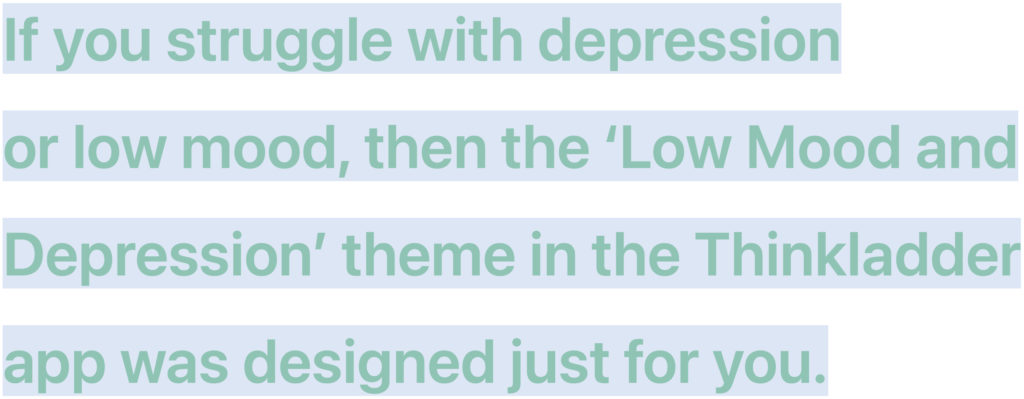Try out the Low Mood & Depression Theme in the Thinkladder app here:
The very nature of having a depressed mood can leave us feeling like we’re powerless to do anything about it. It can seem impossible to access the energy or motivation to do the things that could help us feel better. However, even very small actions can make a big difference for our mood in the long run. While it is important for us to see our doctor and counsellor, there are also things we can do to help ourselves.
The ways that we think and behave can help or hinder us when we are feeling depressed. One thing we can do is to identify the limiting beliefs that are feeding into our depression. These could be something like, ‘There is no way out of this fog,’ or ‘I have to keep away from others in case I infect them with my depression’. Identifying these unhelpful thoughts is a powerful first step. We can then systematically challenge them with insights to the contrary.
If you struggle with depression or low mood, then the ‘Low Mood and Depression’ theme in the Thinkladder app was designed just for you.
Insights from the “Low Mood & Depression” Theme
This depression is a cloud that has settled on my life for a time; but the winds will change, the skies will clear, and the sun will come out again.
Practical tips to overcome low mood and depression:
Identify your individual needs: Everyone has a unique set of needs that, when met, empower them to thrive. Experiencing persistent low mood may indicate an unmet need or imbalance within your lifestyle. Take a personal stock take of your individual needs to understand what gaps may need to be filled. Start with the basics, like getting enough sleep, eating a balanced diet, and exercising regularly. Think about what is important to you, like hobbies, time in nature, and connection with others.
Limit stress: Identify and reduce sources of stress in your life as much as possible. Consider relaxation techniques (such as deep breathing or meditation). Taking guilt-free time to relax and recharge is important for managing low mood and depression.
Establish a routine: Creating a structured daily routine provides a sense of stability and purpose. Set realistic goals and break them down into smaller, achievable steps. Having a routine can help you to stay motivated and provide a sense of accomplishment as you complete tasks throughout the day.
Engage in activities you enjoy: Make space for hobbies, creative pursuits, or activities that you find meaningful. Doing these things can help improve your mood and overall well-being. Find ways to incorporate these activities regularly, even if you don’t feel motivated initially.
Avoid self-isolation: Depression may make you feel like withdrawing from social interactions. Even so, it’s important to maintain connection with others. Surround yourself with supportive and understanding people. Reach out to friends, family, or support groups who can offer emotional support. Sharing your feelings and experiences with a trusted person can be tremendously helpful in times of low mood and depression.
Consider engaging in regular exercise: Exercise doesn’t need to be intense to help. Physical activity is scientifically proven to boost feel-good hormones and improve overall mood. Try going for a walk, practising yoga, or engaging in any other physical activity you enjoy. Incorporating regular exercise into your routine can significantly improve mood and energy levels.
Seek professional help: If you’re experiencing persistent low mood or depression, get help. Reach out to a mental health professional, such as a doctor or counsellor. They can provide guidance, support, and appropriate treatment options tailored to your specific needs.
Use Thinkladder: Identify and challenge any limiting beliefs relating to your low mood and depression. Thinkladder’s personalised Insights can help you to rewire old patterns and empower you to forge a new path.
Remember, everyone’s experience with low mood and depression is unique. It may take time to find the strategies that work best for you. Be patient with yourself, and don’t hesitate to reach out for professional help and support.
Related topics: People Pleasing, Self-Worth, Anxiety & Comparing Myself To Others.


